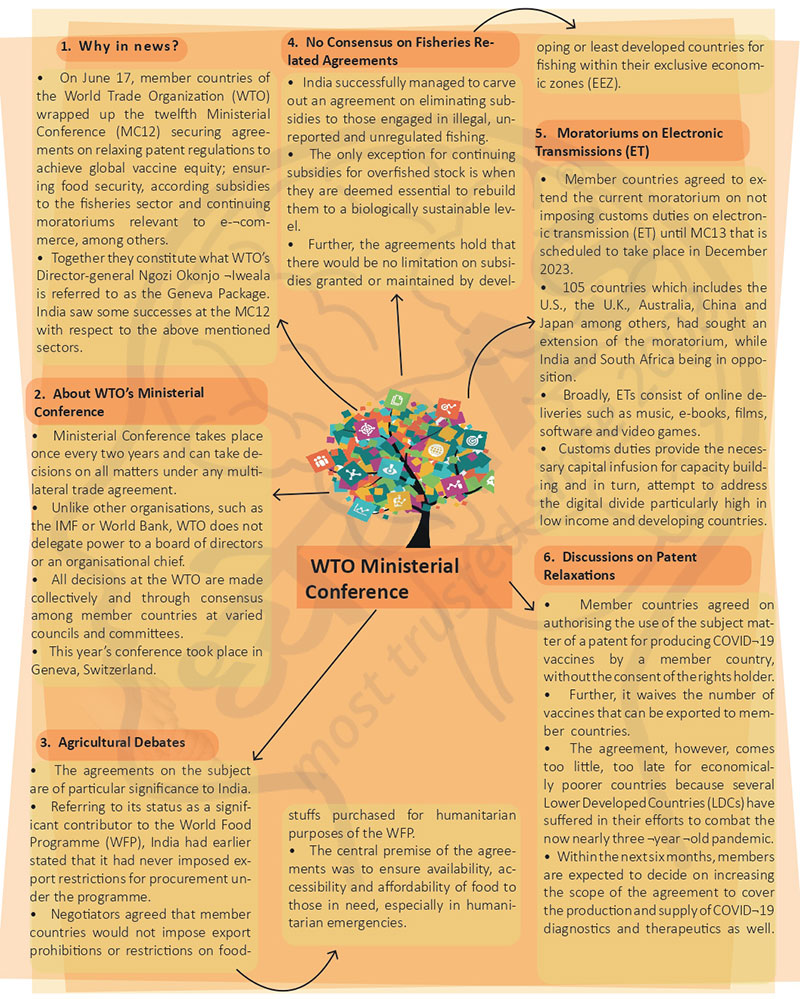Brain-booster
/
10 Jul 2022
Brain Booster for UPSC & State PCS Examination (Topic: WTO Ministerial Conference)

Why in news?
- On June 17, member countries of the World Trade Organization (WTO)
wrapped up the twelfth Ministerial Conference (MC12) securing agreements on
relaxing patent regulations to achieve global vaccine equity; ensuring food
security, according subsidies to the fisheries sector and continuing
moratoriums relevant to e-¬commerce, maong otehrs.
- Together they constitute what WTO’s Director-general Ngozi Okonjo ¬Iweala
is referred to as the Geneva Package. India saw some successes at the MC12
with respect to the above mentioned sectors.
About WTO’s Ministerial Conference
- Ministerial Conference takes place once every two years and can take
decisions on all matters under any multilateral trade agreement.
- Unlike other organisations, such as the IMF or World Bank, WTO does not
delegate power to a board of directors or an organisational chief.
- All decisions at the WTO are made collectively and through consensus
among member countries at varied councils and committees.
- This year’s conference took place in Geneva, Switzerland.
Agricultural Debates
- The agreements on the subject are of particular significance to India.
- Referring to its status as a significant contributor to the World Food
Programme (WFP), India had earlier stated that it had never imposed export
restrictions for procurement under the programme.
- Negotiators agreed that member countries would not impose export
prohibitions or restrictions on food-stuffs purchased for humanitarian
purposes of the WFP.
- The central premise of the agreements was to ensure availability,
accessibility and affordability of food to those in need, especially in
humanitarian emergencies.
No Consensus on Fisheries Related Agreements
- India successfully managed to carve out an agreement on eliminating
subsidies to those engaged in illegal, unreported and unregulated fishing.
- The only exception for continuing subsidies for overfished stock is when
they are deemed essential to rebuild them to a biologically sustainable
level.
- Further, the agreements hold that there would be no limitation on
subsidies granted or maintained by developing or least developed countries
for fishing within their exclusive economic zones (EEZ).
Moratoriums on Electronic Transmissions (ET)
- Member countries agreed to extend the current moratorium on not imposing
customs duties on electronic transmission (ET) until MC13 that is scheduled
to take place in December 2023.
- 105 countries which includes the U.S., the U.K., Australia, China and
Japan among others, had sought an extension of the moratorium, while India
and South Africa being in opposition.
- Broadly, ETs consist of online deliveries such as music, e-books, films,
software and video games.
- Customs duties provide the necessary capital infusion for capacity
building and in turn, attempt to address the digital divide particularly
high in low income and developing countries.
Discussions on Patent Relaxations
- Member countries agreed on authorising the use of the subject matter of
a patent for producing COVID¬19 vaccines by a member country, without the
consent of the rights holder.
- Further, it waives the number of vaccines that can be exported to member
countries.
- The agreement, however, comes too little, too late for economically
poorer countries because several Lower Developed Countries (LDCs) have
suffered in their efforts to combat the now nearly three ¬year ¬old
pandemic.
- Within the next six months, members are expected to decide on increasing
the scope of the agreement to cover the production and supply of COVID¬19
diagnostics and therapeutics as well.







